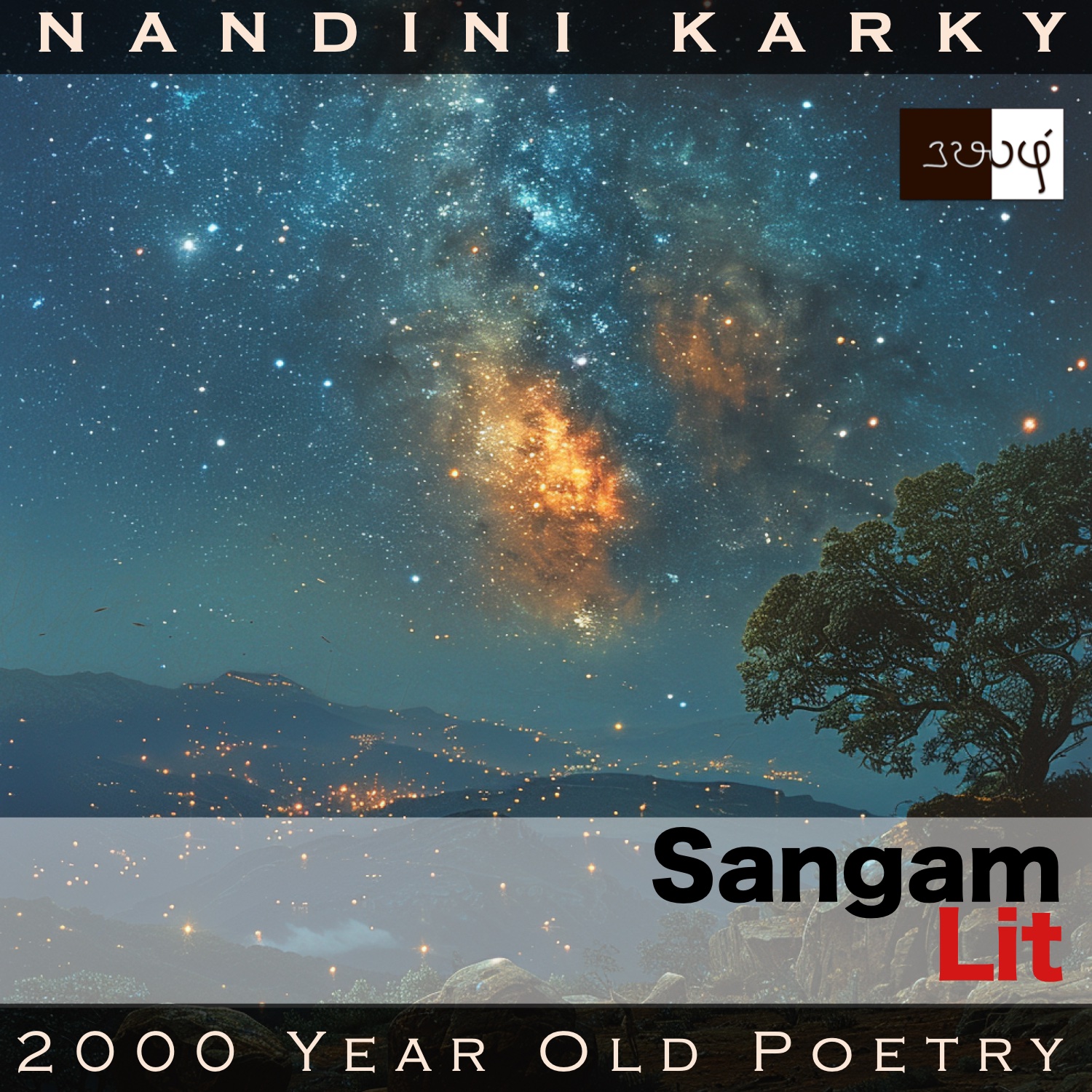Podcast: Play in new window | Download
Subscribe: Apple Podcasts | Spotify | Amazon Music | Android | iHeartRadio | Email | TuneIn | RSS | More
In this episode, we perceive the trust of a poet in a patron, as portrayed in Sangam Literary work, Puranaanooru 383, penned about the Leader Aviyan by the poet Maarokaththu Nappasalaiyaar. Set in the category of ‘Paadaan Thinai’ or ‘Praise’, the verse reveals the emotions of the poet after receiving the leader’s patronage.

ஒண்பொறிச் சேவல் எடுப்ப, ஏற்றெழுந்து,
தண் பனி உறைக்கும் புலரா ஞாங்கர்,
நுண் கோல் சிறு கிணை சிலம்ப ஒற்றி,
நெடுங் கடை நின்று, பகடு பல வாழ்த்தி,
தன் புகழ் ஏத்தினெனாக, என் வலத்து
இடுக்கண் இரியல் போக ஊன் புலந்து
அருங் கடி வியல் நகர்க் குறுகல் வேண்டி,
கூம்பு விடு மென் பிணி அவிழ்த்த ஆம்பல்
தேம் பாய் உள்ள தம் கமழ் மடர் உள,
பாம்பு உரி அன்ன வடிவின, காம்பின்
கழை படு சொலியின் இழை அணி வாரா,
ஒண் பூங் கலிங்கம் உடீஇ, நுண் பூண்
வசிந்து வாங்கு நுசுப்பின், அவ் வாங்கு உந்தி,
கற்புடை மடந்தை தன் புறம் புல்ல,
எற் பெயர்ந்த நோக்கி……………………………….
………………………………………….கல் கொண்டு,
அழித்துப் பிறந்தனெனாகி, அவ் வழி,
பிறர், பாடு புகழ் பாடிப் படர்பு அறியேனே;
குறு முலைக்கு அலமரும் பால் ஆர் வெண் மறி,
நரை முக ஊகமொடு, உகளும், சென…………….
…………………..குன்று பல கெழீஇய
கான் கெழு நாடன், கடுந் தேர் அவியன், என
ஒருவனை உடையேன்மன்னே, யானே;
அறான்; எவன் பரிகோ, வெள்ளியது நிலையே?
Another intricate verse with many missing lines. The words of this female poet can be translated as follows:
“As the rooster with radiant spots crowed and woke me up, rising up on that cool, dew-filled morning that hadn’t dawned yet, striking my small ‘kinai’ drum with my light and delicate stick, standing in the long front yard, I sang about his oxen and praised his fame, wanting to relieve the great suffering that had enveloped me and made me thin and famished. As I entered his well-guarded, wide mansion, he was there, holding toddy with honey in a fragrant bowl, akin to a water-lily that has opened out its delicate buds. Wearing a shining, floral garment that was in the texture of snake skin and in the hue of the inner side of a bamboo stalk, with countless well-stitched threads, having a narrow waist shining with intricately carved ornaments, and a gently curving belly, was his virtuous royal maiden, by his side. He turned and looked at me….
After that, I felt as if I was dead before and am born again. Just then, I decided that I shall never go seeking others to sing their praises. A goat kid wanting to suckle runs around the small udders of the mother goat and then leaps along with a grey-faced monkey… With such peaks many, is the jungle-filled country of this lord, Aviyan, with speedy chariots, the one who never swerves from justice. When I have him as my leader, I have no fear about what would happen, reading the signs of the stars in the sky.”
Let’s explore the details. The poet begins by talking about how she woke up on a cool morning when it was not yet dawn, woken up by the crowing rooster, and she decided to go to the palace of this leader. Arriving there at his huge front yard, she started playing on her drum with her stick, and started singing about the wealth of this leader, and in particular, about the ploughing bulls of his. Her intention was to end her poverty by reaching out to this leader. In the next section, she talks about a cup or bowl shaped like a fully blossomed lily which seemed to hold toddy and honey. She also mentions about delicate clothes, so intricate like a snake skin and with a radiant hue of the inner portion of a bamboo sheath, made of dense fibres and shining with its floral designs. Interpreters have varying views about these two descriptions. Some say the leader gave that food and those clothes to this poet. Some say he gave only the food and the clothes were worn by someone else. Reading the verse repeatedly, my instinct told me that the cup being spoken about must have been in the hands of the leader that this poet is seeing before her in his huge mansion. And, those delicate clothes must belong to the leader’s wife, whom the poet describes as wearing well-etched ornaments on her waist and lying by the side of this leader. This is to illustrate the wealth and pleasure aspect of this leader’s life, something deemed important in the portrait of a patron.
The poet details how the leader turned and looked at her but the words following this are lost in time. When she continues, she declares that she feels as if she’s born again and that she wants nothing more and that she will never sing about anyone else anymore. She talks about the fertile country of this lord where goat kids and grey-faced monkeys play together. The leader then, she sketches, as someone who never goes away from the path of justice. The poet concludes with the words saying with such a leader as her protector, she has no worry about the disheartening signs about the future, seen in the position of stars and planets in the sky. This tells us that astronomical observation and prediction about farming and famines was done in Sangam times. Perhaps, watching the skies so closely, they could tell which year the rains would fail, and consequently, there would be a dearth of resources. A verse that has presented us with intricate details about vessels and clothes used in Sangam times, as well as their observation of the skies, all in a simple verse, praising a leader’s generosity.




Share your thoughts...